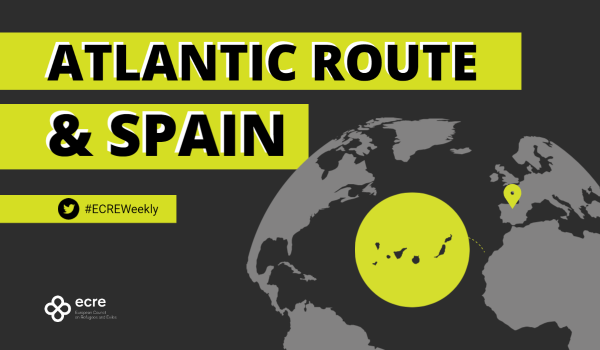- The European Border and Coast Guard Agency (Frontex) and Spanish authorities have renewed their agreement for 2024 after a temporary suspension over concerns about the protection of migrant data amid increased arrivals to the Canary Islands.
- ECRE member organisation the Spanish Commission for Refugee Assistance (CEAR) describes the situation of asylum seekers stuck in limbo in Madrid airport as “inhumane” and “unsustainable”.
- Morocco has completed the construction of a massive wall around Melilla while the Spanish foreign minister has announced ongoing financial support to the United Nations Agency for Palestinian Refugees (UNRWA).
People continue to take the fatal journey to reach Spain. Nearly 600 people, including children, arrived on 28 January alone in six separate canoes and a boat, following the disembarkation of three other boats carrying 153 people on El Hierro and Gran Canaria. Between 26 and 28 January, over 1200 migrants arrived on dinghies and five people lost their lives whilst trying to reach Spanish islands. Two of them were onboard a boat carrying 69 people, including 11 minors, which was spotted by the national coastguard less than a mile south of El Hierro. Five other survivors were taken to hospital. Two of the bodies were buried in El Pinar cemetery. The other other three were transported to the port of La Estacain a canoe carrying a total of 50 people, including some with medical emergencies. They were buried in Valverde cemetery while seven survivors were taken to hospital. According to journalist Txema Santana, on 25 January, nearly 4000 migrants reached the Canary Islands in the first 25 days of 2024. Reportedly, most of them are from Mauritania but also Senegal, Morocco and Western Sahara. Meanwhile, the 2024 agreement between the European Border and Coast Guard Agency (Frontex) and Spain for the management of joint operations at the country’s external borders was renewed on 31 January after operations had been suspended on 24 January over a “technical issue”. According to sources at the Spanish Ministry of the Interior, the Spanish authorities had concerns over “losing ownership of its responsibility” for migrant data. However, the compromise reached between both sides gives Spain full control of the most sensitive data.
Elsewhere, several hundred asylum seekers have been stuck in limbo at Madrid airport, sleeping in cramped spaces for the past two weeks. Rights groups have described the situation as “unsustainable” and “inhumane”. According to ECRE member organisation the Spanish Commission for Refugee Assistance (CEAR), the number of people seeking asylum at Madrid Airport has been increasing since last summer. CEAR spokesperson Elena Munoz told Reuters that up to 400 people were stuck at the airport in the week of 22 January, saying “more and more arrive every day” and “People sleep on mattresses on the floor, sometimes several per mattress … There are bed bugs and cockroaches”. She that some of the issues causing this situation at the airport included a shortage of interpreters and long waiting times of 10-20 days for applications to be processed. However, a spokesperson for the Spanish interior ministry “couldn’t” give an estimate for the number of people affected, saying that the number of migrants “fluctuates” with flight arrivals. While the ministry highlighted the availability of three rooms for asylum seekers (with a fourth to be opened imminently), increased surveillance and cleaning capacity, the National Police has reported insufficient space and poor hygienic conditions. As a result, the Spanish Red Cross has decided to suspend its operations temporarily in the airport. “There comes a time when there is no point in continuing to do a job if we cannot take care of these people as they deserve”, Jose Sanchez from the organisation said. “All these people are fleeing from very difficult situations”, he added. Consequently, on 24 January, Spain’s embassy in Senegal announced that new rules would be introduced on 19 February requiring Senegalese travelers to hold a transit visa if their journey included a layover at a Spanish airport. While Spanish authorities are focusing their efforts on preventing arrivals to its territories, CEAR has reiterated calls for a humanitarian route or visa that would allow people to claim asylum on Spanish soil.
The Moroccan Association for Human Rights (AMDH) has said that Spain’s “fundamental ally”, the Moroccan authorities, have completed the construction of a “new, massive barrier around Melilla”. According to the association, the wall includes “a 7m high barbed wire fence, an almost 3m deep trench and more repressive military forces deployed 24/7”. Meanwhile, the Moroccan Armed Forces (FAR) intercepted a boat carrying 52 people seeking to reach the Canary Islands. Separately, the Spanish Minister of Foreign Affairs, José Manuel Albares, announced that his country would continue its funding to the United Nations Agency for Palestinian Refugees (UNRWA). “We will not modify our relationship with UNRWA although we are closely monitoring the internal investigation and the results it may yield due to the actions of a dozen of the around 30,000 people who work for the agency”, the minister said.
For further information:
- ECRE, Atlantic Route and Spain: 2023 Marked as the Deadliest Year, Fatal Crossing Attempts, Rescue Efforts and Interceptions by Spain’s African Partners Continue, January 2024
- ECRE, Atlantic Route and Spain: Increase of Arrivals to Canary Islands Amid Ongoing Deaths and Distress, Senegal Receives Drones & Guards from Spanish Government to Curb Boat Departures, December 2023

